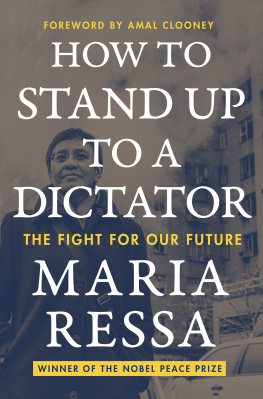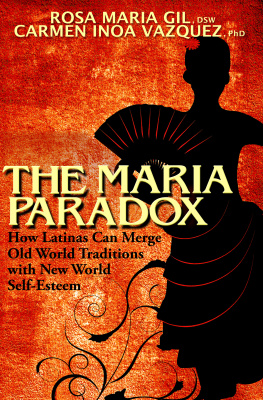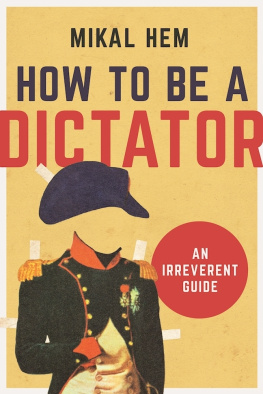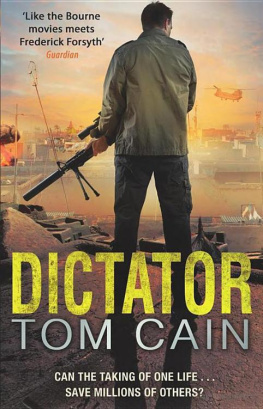Maria Ressa - How to Stand Up to a Dictator
Here you can read online Maria Ressa - How to Stand Up to a Dictator full text of the book (entire story) in english for free. Download pdf and epub, get meaning, cover and reviews about this ebook. year: 2022, publisher: HarperCollins, genre: Politics. Description of the work, (preface) as well as reviews are available. Best literature library LitArk.com created for fans of good reading and offers a wide selection of genres:
Romance novel
Science fiction
Adventure
Detective
Science
History
Home and family
Prose
Art
Politics
Computer
Non-fiction
Religion
Business
Children
Humor
Choose a favorite category and find really read worthwhile books. Enjoy immersion in the world of imagination, feel the emotions of the characters or learn something new for yourself, make an fascinating discovery.
- Book:How to Stand Up to a Dictator
- Author:
- Publisher:HarperCollins
- Genre:
- Year:2022
- Rating:4 / 5
- Favourites:Add to favourites
- Your mark:
- 80
- 1
- 2
- 3
- 4
- 5
How to Stand Up to a Dictator: summary, description and annotation
We offer to read an annotation, description, summary or preface (depends on what the author of the book "How to Stand Up to a Dictator" wrote himself). If you haven't found the necessary information about the book — write in the comments, we will try to find it.
How to Stand Up to a Dictator — read online for free the complete book (whole text) full work
Below is the text of the book, divided by pages. System saving the place of the last page read, allows you to conveniently read the book "How to Stand Up to a Dictator" online for free, without having to search again every time where you left off. Put a bookmark, and you can go to the page where you finished reading at any time.
Font size:
Interval:
Bookmark:
For journalists and citizens who
#HoldTheLine
W hen you think of a superhero, you may not imagine a five-foot-two-inch woman with a pen in her hand. But today, journalists operating in authoritarian countries need superpowers.
They face daily threats to their reputation, their freedom, andin some placestheir life. And Maria Ressa is one of them.
To say that Maria fights against the odds is an understatement. In an autocracy, a journalists opponent is the statewhich makes policy, controls the police, hires the prosecutors, and readies the prisons. It has an army of bots active online to vilify and undermine anyone deemed an opponent. It has the power to take down broadcasters and online sites. Most important: it has a need to control the message in order to survive. Its existence depends on ensuring that there is only one side to every story.
As a famous philosopher once said, there is no greater tyranny than that which is perpetrated under the shield of the law and in the name of justice. Yet under President Duterte, the Philippine government did not hesitate to use legal tools to try to intimidate perceived opponents. The authorities revoked Marias media license and filed civil suits that threaten to bankrupt her. She faces a barrage of bogus prosecutions that threaten her to life behind bars.
Not because she has committed any crimebut because the leaders in her country do not want to hear criticism. So she has a choice: toe the government line and be safe, or risk everything to do her job. She has not hesitated to choose the latter. And I know she will never give up.
Throughout history some of the most important voices in society have been persecuted. Gandhi, Nelson Mandela, and Martin Luther King, Jr., were all prosecuted because they criticized the government of the day. At his criminal sedition trial in India, Gandhi told the judge that he did not want mercy for standing up to a government that was trampling on human rights: I am here... to invite and cheerfully submit to the highest penalty that can be inflicted upon me because non-co-operation with evil is as much a duty as is co-operation with good. He spent two years in prison as a result of his words. But he made India a more just society. Mandela was arrested when his views displeased the government: the charge was high treason, and he spent twenty-seven years in prison as a result. But he brought down the evil of apartheid.
Marias struggle is one that defines our times. Data gathered in the last few years shows that more journalists all over the world are being imprisoned and killed than at any time since records began. And there are, today, more autocracies in the world than there are democracies.
This is why Maria refuses to leave the country, and is determined to defend the charges against her. She knows that an independent voice like hers is always valuable, but becomes essential when others are silent. She is holding up the ceiling for anyone else who dares to speak. Because if Maria, a US citizen and a Nobel Peace laureate, can be locked up for doing her work, what chance is there for others?
It is ironic that autocratic leaders are often called strongmen when in fact they cannot tolerate dissent or even allow a level playing field. It is those who stand up to them whose strength should be celebratedand some of them are only five foot two.
Elie Wiesel warned us that there may be times when we are powerless to prevent injustice, but there must never be a time when we fail to protest. Marias legacy will be felt for generationsbecause she never failed to protest, to try to bend the arc of history toward justice. And when young Filipino students study history, they will find that the first Filipino person ever to be awarded the Nobel Peace Prize was a courageous journalist determined to tell the truth. I hope that, for the sake of future generations, they will be inspired by her example.
Amal Clooney
S ince the pandemic lockdown began in March 2020, I have been far more emotional than I had ever allowed myself to be. I feel the pent-up anger at the injustice I have no choice but to accept. Thats what six years of government attacks have done.
I may go to jail. For the rest of my lifeor, as my lawyer tells me, for more than a hundred years. On charges that should never even have made it to court. The breakdown of the rule of law is global, but it has become, for me, personal. In less than two years, the Philippine government issued ten arrest warrants against me.
I could also be a target of violence. Would the police, my government be stupid enough to target me? Well, yes. The Philippines Commission on Human Rights estimated that about twenty-seven thousand people were killed in less than three years of ex-president Rodrigo Dutertes brutal drug war, from 2016 to 2018. True? Who knows? That statistic is the first casualty in my countrys battle for truth. In 2018, I began wearing a bulletproof vest on the road.
Online violence is real-world violence. That has been proven by so much research and so many tragic events around the world. I am targeted online every day, along with thousands of other journalists, activists, opposition leaders, and unsuspecting citizens here and around the globe.
Yet when I wake up and look out the window, I am energized. I have hope. I see the possibilitieshow, despite the darkness, this is also a time when we can rebuild our societies, starting with whats right in front of us: our areas of influence.
The world we once knew is decimated. Now we have to decide what we want to create.
M y name is Maria Ressa. I have been a journalist for more than thirty-six years. I was born in the Philippines, was raised and educated in New Jersey, and returned to my native country after college in the late 1980s. I made my career at CNN, creating and running two bureaus in Southeast Asia during the 1990s. It was the glory days of CNN and a heady time for international journalists. From my perch in Southeast Asia, I was an eyewitness to dramatic events that often foreshadowed what would happen around the world: emerging democratic movements in former colonial outposts, the terrifying rise of Islamic terrorism well before 9/11, a new class of democratically elected strongmen who would turn their countries into quasi dictatorships, and the stunning promise and power of social media, which would soon play a pivotal role in tearing down everything I hold dear.
In 2012, I cofounded Rappler, a digital-only news website in the Philippines. My ambition was to create a new standard of investigative journalism in my country, one that would harness the social media platforms to build communities of action for better governance and stronger democracies. At the time, I was the truest of true believers in the power of social media to do good in the world. Using Facebook and other platforms, we were able to crowdsource breaking news, find pivotal sources and tips, harness collective action for climate change and good governance, and help increase voter knowledge and participation in our elections. We were a fast success, but by Rapplers fifth year of existence, we had gone from being lauded for our ideas to being targeted by our governmentall because we continued to do our jobs as journalists: to tell the truth and hold power to account.
At Rappler, we exposed corruption and manipulation not only in government but increasingly in the technology companies that were already dominating our lives. Starting in 2016, we began highlighting impunity on two fronts: President Rodrigo Dutertes drug war and Mark Zuckerbergs Facebook.
Let me tell you why the rest of the world needs to pay attention to what happens in the Philippines: 2021 was the sixth year in a row that Filipinosout of all global citizensspent the most time on the internet and on social media. Despite slow internet speeds, Filipinos uploaded and downloaded the largest number of videos on YouTube in 2013. Four years later, 97 percent of our countrys citizens were on Facebook. When I told that statistic to Mark Zuckerberg in 2017, he was quiet for a beat. Wait, Maria, he finally responded, looking directly at me, where are the other three percent?
Font size:
Interval:
Bookmark:
Similar books «How to Stand Up to a Dictator»
Look at similar books to How to Stand Up to a Dictator. We have selected literature similar in name and meaning in the hope of providing readers with more options to find new, interesting, not yet read works.
Discussion, reviews of the book How to Stand Up to a Dictator and just readers' own opinions. Leave your comments, write what you think about the work, its meaning or the main characters. Specify what exactly you liked and what you didn't like, and why you think so.










